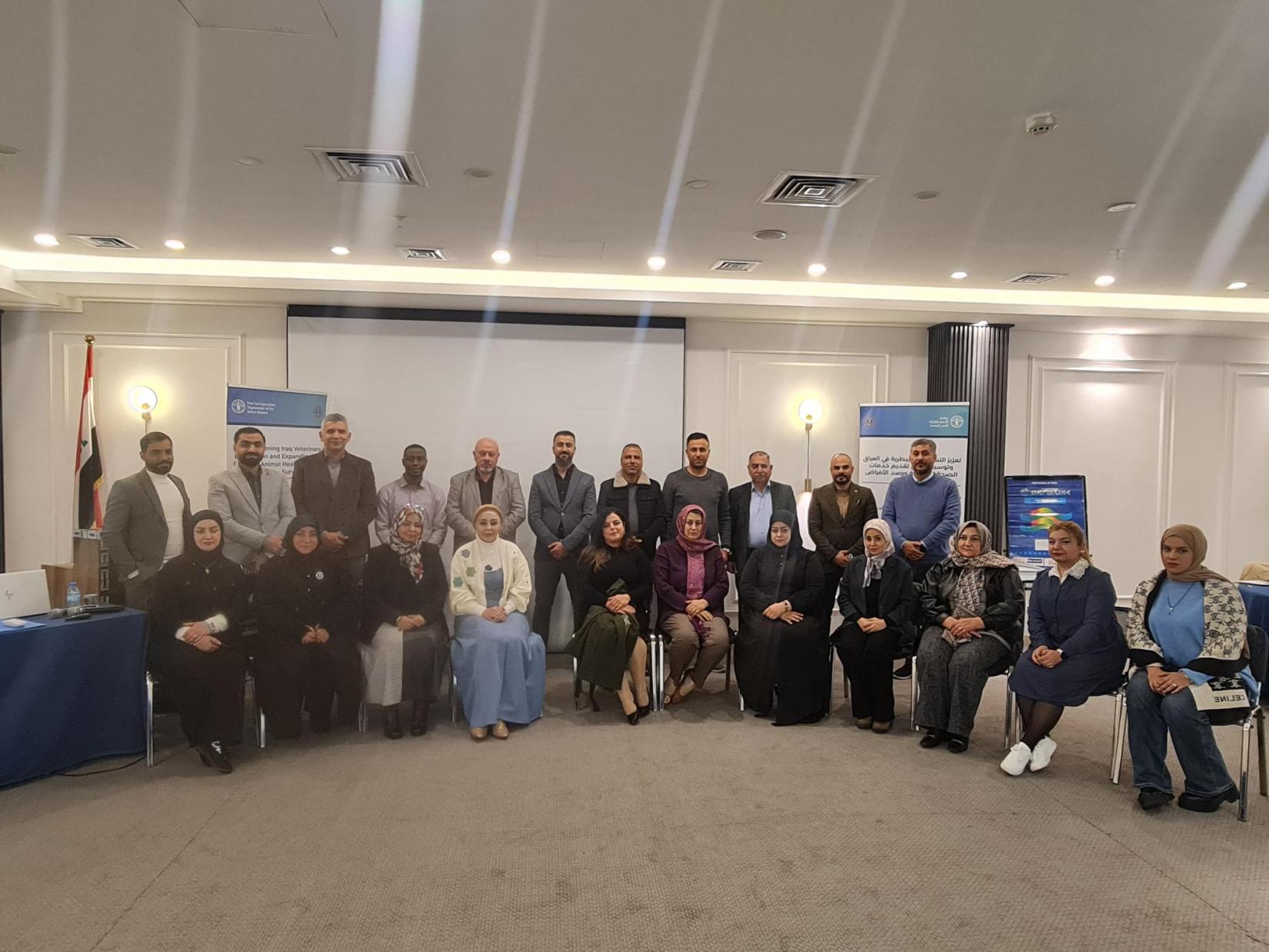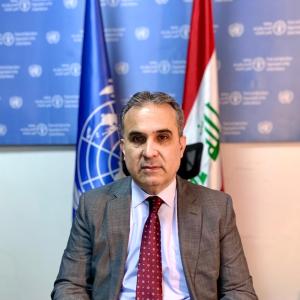FAO strengthens veterinary capacities in epidemiology and disease surveillance in Iraq
26 December 2024
Erbil, Iraq, 26 December 2024,
The Food and Agriculture Organization of the United Nations (FAO) in Iraq conducted a comprehensive five-day Training of Trainers (ToTs) workshop on veterinary epidemiology and disease surveillance in Erbil under activities of the project of "Strengthening Iraq Veterinary Legislation and Expanding Delivery of Animal Health Services and Disease Surveillance". This initiative aimed to address critical gaps in Iraq’s veterinary surveillance and reporting systems, particularly at central levels and in underserved governorates.

Veterinary epidemiology plays a crucial role in examining disease patterns in animal populations to control outbreaks and protect public health. Effective surveillance relies on systematic animal health data collection and analysis, ensuring prompt responses to emerging threats. Enhancing veterinary staff's epidemiology skills improved disease surveillance and early warning systems, ensuring socio-economic stability and public health.
Dr. Salah ElHajj Hassan, FAO Representative in Iraq, emphasized the urgent need to strengthen veterinary systems to address emerging disease risks. “Improving surveillance and early warning capabilities is key to protecting livestock health and food security. By equipping veterinary staff with critical skills, Iraq can better prevent and manage disease outbreaks, safeguarding livelihoods and ensuring food security. This workshop reflects FAO’s commitment to building sustainable, science-based veterinary capacities across Iraq within One Health approach" he said.
The workshop focused on enhancing the disease surveillance and early warning capabilities of veterinary staff through comprehensive training in systematic data collection, analysis, and reporting. This was designed to ensure rapid detection and effective management of livestock diseases, contributing to stronger disease prevention efforts in Iraq.
The training covered several key areas, including basic epidemiology concepts, the design and implementation of animal disease surveillance plans, surveillance methods, sampling procedures, disease reporting systems, and techniques for investigating disease outbreaks.
A total of 24 participants attended the workshop, representing a broad range of stakeholders involved in animal health and disease surveillance. These included field veterinarians and laboratory staff from targeted governorates, selected staff from the Baghdad Epidemiology Department, staff members from the GDVAW/Erbil Animal Health Department, and representatives from slaughterhouse departments in Baghdad and Erbil.
By equipping veterinary staff with critical skills in disease surveillance and reporting, the project aimed to prevent livestock disease outbreaks, protect livelihoods, and enhance food security in the region. Through systematic training and the cascading of expertise, the program contributed to the development of resilient and effective veterinary systems across Iraq.

He started his career in 1984, as Senior Research Assistant in the Agricultural Research and Education Centre (AREC), American University of Beirut. From 1987 to 1991, he was Coordinator of the Student Training Programme, and also Agriculture and Horticultural Teacher for the Faculty of Agriculture, at the Lebanese University.
From 1991 to 1995, he worked as Agricultural Engineer at the Ministry of Agriculture, Bekaa Regional Office, Zahlah and was then assigned to the Agricultural Research Institute in the Tal Amara station, first as Head of the Crop Production Department and subsequently in charge of the Plant Protection Laboratory. From 2002 to 2006, he was Director of the Kfardane Research Station (Agricultural Research Institute). In 2008, he became Visiting Scientist at the International Maize and Wheat Improvement Centre (CIMMYT) and Coordinator of a project with the International Centre for Atomic Energy Agency, Vienna.
In 2010, he served as Advisor to the Minister for Agriculture of Lebanon. In 2011, he became President of the Pesticide Scientific Committee, Head of the Phytoplasma Committee and Director of the Agriculture and Rural Development Programme (ARDP) (EU-funded project). From 2010 to 2013, he represented Lebanon in negotiations with EU, Egypt, Jordan and Iraq. During his career, Mr Hajj Hassan also carried out a number of other functions. He represented the Lebanese Agricultural Research Institute (LARI) in several research programmes with the International Centre for Agricultural Research in the Dry Areas (ICARDA) and the American University of Beirut. He was Coordinator of the Mashreq/Maghreb project with ICARDA, representing Lebanon in the Steering Committee, as well as being the Head of the Sugar-beet Delivery and of the Wheat Delivery Committees. For a number of years, Mr Hajj Hassan worked for the preparation of FAO TCP projects and served as the National Director of a TCP project. He joined FAO in January 2014 as FAO Representative in Yemen. Mr Hajj Hassan succeeds Mr El Zubi as FAO Representative in Iraq.



